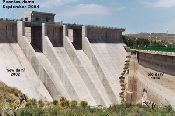Over the last three decades and seven research Framework Programmes (FP), the European Union has invested considerable amounts of funding into the causes and consequence of desertification, both as it affects parts of Mediterranean Europe and worldwide.
The symposium Desertification in Europe, held in Mytilene in 1984, is often cited as the birth place of European desertification research. Initially the focus of the programmes was on climate change as the main driver of desertification, but that quickly moved to include the evaluation of human drivers too, with Mediterranean Desertification being recognised as an issue in its own right. With the start of FP5 (in 1998) the newly ratified UNCCD and the National Focal Points became obvious end users of European research and projects were funded to develop that collaboration.
By FP6 (2002), a significant body of research data and understanding of desertification processes (particularly bio-physical ones) had been accumulated and projects started to look at the exploitation and practical application of the research knowledge, with the development of detailed management options to combat desertification and their demonstration in affected areas, including those outside Mediterranean Europe.
FP7 (2007) saw the focus shift slightly to the responses made to desertification and ecosystem services decline, with the links between bio-physical and socio-economic processes being emphasised plus support for decision-making and facilitating knowledge transfer to stakeholders, including those at the institutional level.
The articles below contain details of many of the EU-funded desertification-related research projects, particularly those from the more recent Framework Programmes. |
||||||
Global context
| The bigger picture |
| What is desertification? |
| UNCCD |
Desertification research
| Global collaboration |
| Recent European research |
| DESIRE Project |

Acknowledgement
The DESIRE project was
|
DESIRE brought together the expertise of
26 international research institutes
and non-governmental organisations.
This website does not necessarily
represent the opinion of the
European Commission. The European
Commission is not responsible for
any use that might be made of the
information contained herein. 
 Recent European research
Recent European research



